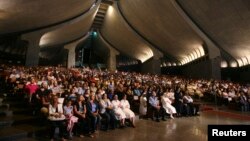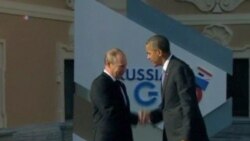President Barack Obama and senior officials of his administration are trying hard to broaden domestic and foreign support for a limited military action in Syria, but so far that effort has produced mixed results.
The president spoke to the American people directly Saturday in his weekly address, explaining why he feels it is necessary for the United States to take military action against the Syrian government's alleged chemical weapons attack in August, and asking for support.
Indirectly acknowledging public-opinion surveys that show many ordinary Americans strongly oppose U.S. military action in Syria, Obama said he can understand the public's war-weariness. He pledged that no members of the U.S. military would be sent into Syria under his plan, and put the issue in moral terms:
"We are the United States of America," he said. "We cannot turn a blind eye to images like the ones we have seen out of Syria."
The president also said a failure to act now could damage U.S. national security. Standing by instead of taking action would increase the risk, he said, "that chemical weapons could be used again; that they would fall into the hands of terrorists who might use them against us, and it would send a horrible signal to other nations that there would be no consequences for their use of these weapons."
Anti-war protesters were outside the White House Saturday, shouting “Obama, hands off Syria!"
Watch President Obama's weekly address:
G20 leadership split
The president has just returned home from the Group of 20 economic summit in Russia, where the crisis in Syria dominated many of the national leaders' private discussions. Russian President Vladimir Putin remains strongly opposed to any Western raid against Syria, in part because he contends any illegal chemical weapons used against civilians in Syria were triggered by rebels, not by government forces supporting President Bashar al-Assad.
Story continues below video, 'World Powers Split Over US Plan':
The president spoke to the American people directly Saturday in his weekly address, explaining why he feels it is necessary for the United States to take military action against the Syrian government's alleged chemical weapons attack in August, and asking for support.
Indirectly acknowledging public-opinion surveys that show many ordinary Americans strongly oppose U.S. military action in Syria, Obama said he can understand the public's war-weariness. He pledged that no members of the U.S. military would be sent into Syria under his plan, and put the issue in moral terms:
"We are the United States of America," he said. "We cannot turn a blind eye to images like the ones we have seen out of Syria."
The president also said a failure to act now could damage U.S. national security. Standing by instead of taking action would increase the risk, he said, "that chemical weapons could be used again; that they would fall into the hands of terrorists who might use them against us, and it would send a horrible signal to other nations that there would be no consequences for their use of these weapons."
Anti-war protesters were outside the White House Saturday, shouting “Obama, hands off Syria!"
Watch President Obama's weekly address:
President Obama is preparing a televised address to the nation on Syria late Tuesday, and White House officials say he is planning a marathon round of interviews with at least six television networks on Monday, all slated for evening broadcast.
G20 leadership split
The president has just returned home from the Group of 20 economic summit in Russia, where the crisis in Syria dominated many of the national leaders' private discussions. Russian President Vladimir Putin remains strongly opposed to any Western raid against Syria, in part because he contends any illegal chemical weapons used against civilians in Syria were triggered by rebels, not by government forces supporting President Bashar al-Assad.
Story continues below video, 'World Powers Split Over US Plan':
Putin claims a majority of national leaders at the St. Petersburg summit agreed with him, but the United States issued a statement co-signed by 10 nations calling for a "strong international response" to the attack on Syria.
The statement did not specify what that response should be.
Pope leads peace prayers
Earlier in the week, Pope Francis wrote to leaders of the G20 summit, urging them to abandon pursuit of a military solution in Syria.
Answering a call by Pope Francis, Christians in many parts of the world prayed for peace in Syria Saturday. The leader of the Roman Catholic Church, addressing tens of thousands of people at the Vatican, said "war always marks the failure of peace" and is a "defeat for humanity." He asked the faithful gathered in St. Peter's Square to pray for peace and reconciliation in Syria and throughout the world.
Syrian Christians gathered at their cathedral in Damascus, where an archbishop of the Syrian Orthodox patriarchate said followers of all religious doctrines were, on this day, "all of one heart — all the Syrians — in the churches and mosques of our different doctrines," for peace.
Kerry campaigns for EU support
The American Secretary of State John Kerry, meanwhile, visited Lithuania and France Saturday on a mission to broaden European support for an attack.
In Vilnius, where European foreign ministers met, Kerry heard the European Union's foreign-policy chief, Catherine Ashton, call for a "clear and strong response" to the Syrian chemical-weapons attack, but under the auspices of the United Nations.
Kerry later appeared in Paris together with French Foreign Minister Laurent Fabius. The top American diplomat, who has been one of the most outspoken members of Obama's inner circle in calling for action against Syria, acknowledged some European countries remain reluctant to back military action, but he added there is overwhelming support for holding the Syrian regime accountable for its purported use of chemical weapons.
"This is growing, not receding, in terms of the global sense of outrage of what’s happened,” he said.
Some nations have expressed a desire to wait until a report by a U.N. chemical weapons team that visited the site of the alleged attack to collect evidence. French President Francois Hollande said the U.N. team is expected to present its report by the end of next week.
Experts debate strike
Jeffrey Mankoff, an expert on Russia and Eurasia from the Center for Strategic and International Studies in Washington, appeared on VOA's weekly program Encounter, where he expressed skepticism about prospects for a U.S. strike against Syria.
"It is clear that the United States has very little international support in seeking to carry this out," Mankoff said.
Analyst Mark Jacobson of the German Marshall Fund policy group, also on Encounter, disagreed.
"I personally think that the United States has no choice but to respond militarily," he said.
Jacobson said the U.S. has an obligation to enforce norms against poisoning civilians and a use of chemical weapons.
Congressional vote
In additional to President Obama's speeches and appearances in the coming days, members of his administration have been intensively lobbying members of the House of Representatives and Senate, who are expected to vote sometime after Tuesday on resolutions authorizing the president to take action against Syria.
A key Senate panel voted on Wednesday in favor of action.
U.S. officials say they have evidence that more than 1,400 people were killed by poison gas in an attack on August 21 in areas on the fringe of Damascus populated by supporters of the opposition.
VOA White House Correspondent Kent Klein contributed to this report. Some information for this report was provided by AP, AFP and Reuters.
The statement did not specify what that response should be.
Pope leads peace prayers
Earlier in the week, Pope Francis wrote to leaders of the G20 summit, urging them to abandon pursuit of a military solution in Syria.
Answering a call by Pope Francis, Christians in many parts of the world prayed for peace in Syria Saturday. The leader of the Roman Catholic Church, addressing tens of thousands of people at the Vatican, said "war always marks the failure of peace" and is a "defeat for humanity." He asked the faithful gathered in St. Peter's Square to pray for peace and reconciliation in Syria and throughout the world.
Syrian Christians gathered at their cathedral in Damascus, where an archbishop of the Syrian Orthodox patriarchate said followers of all religious doctrines were, on this day, "all of one heart — all the Syrians — in the churches and mosques of our different doctrines," for peace.
Kerry campaigns for EU support
The American Secretary of State John Kerry, meanwhile, visited Lithuania and France Saturday on a mission to broaden European support for an attack.
In Vilnius, where European foreign ministers met, Kerry heard the European Union's foreign-policy chief, Catherine Ashton, call for a "clear and strong response" to the Syrian chemical-weapons attack, but under the auspices of the United Nations.
Kerry later appeared in Paris together with French Foreign Minister Laurent Fabius. The top American diplomat, who has been one of the most outspoken members of Obama's inner circle in calling for action against Syria, acknowledged some European countries remain reluctant to back military action, but he added there is overwhelming support for holding the Syrian regime accountable for its purported use of chemical weapons.
"This is growing, not receding, in terms of the global sense of outrage of what’s happened,” he said.
Some nations have expressed a desire to wait until a report by a U.N. chemical weapons team that visited the site of the alleged attack to collect evidence. French President Francois Hollande said the U.N. team is expected to present its report by the end of next week.
Experts debate strike
Jeffrey Mankoff, an expert on Russia and Eurasia from the Center for Strategic and International Studies in Washington, appeared on VOA's weekly program Encounter, where he expressed skepticism about prospects for a U.S. strike against Syria.
"It is clear that the United States has very little international support in seeking to carry this out," Mankoff said.
Analyst Mark Jacobson of the German Marshall Fund policy group, also on Encounter, disagreed.
"I personally think that the United States has no choice but to respond militarily," he said.
Jacobson said the U.S. has an obligation to enforce norms against poisoning civilians and a use of chemical weapons.
Congressional vote
In additional to President Obama's speeches and appearances in the coming days, members of his administration have been intensively lobbying members of the House of Representatives and Senate, who are expected to vote sometime after Tuesday on resolutions authorizing the president to take action against Syria.
A key Senate panel voted on Wednesday in favor of action.
U.S. officials say they have evidence that more than 1,400 people were killed by poison gas in an attack on August 21 in areas on the fringe of Damascus populated by supporters of the opposition.
VOA White House Correspondent Kent Klein contributed to this report. Some information for this report was provided by AP, AFP and Reuters.






